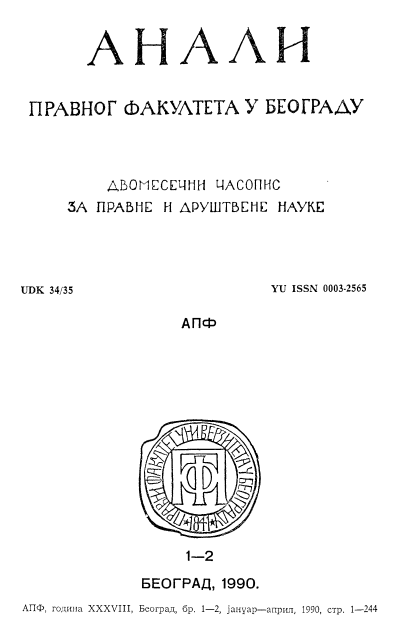ЗАКОН ГРАДА НОВОГ БРДА
THE LAW OF THE NOVO BRDO TOWN OF 1412.
Author(s): Jelena DanilovićSubject(s): History of Law
Published by: Правни факултет Универзитета у Београду
Keywords: Serbia; Domain of Despot; Voivode; Duke; „Purgars’ ” Council
Summary/Abstract: The Kossovo Battle anniversary provoked the author to discuss the life of Serbian state as a Domain of Despot in the first half of the XVth century. As a well organized, although dependent legal state, and exposed to constant wars and Turkish invasion, it was able to provide its population with economic and cultural stability. The topic of this study relates to legal organization of the Novo Brdo town in XVth century and the basic source for it are the fragments of the Town Law which were added to the Law on Mines of Despot Stefan Lazarević, of 1412, the manuscript of which was discovered and published thirty years ago. After an introduction on economic and social situation, the issue is discussed of whether at all the above Law did exist, or the Law on Mines was only supplemented with 23 articles containing the provisions connected to the life in the town. The existing of a separate town law points at the achieved degree of town autonomy, so the author treats in more detail the status of towns in medieval Serbia in general. There is a difference between seaside and continental towns, the former having their own statutes, while the latter ones regulating their relations by charters. Article 137 of Dushan's Code witnesses this fact as to emperor’s towns (the same stanдрoint is expressed by St. Novaković, but not by T. Ta- ranovski). Novo Brdo town, too, probably vas an emperor’s town, but there is no data that charters have been issued to it by Duke Lazar or Despot Stefan, too, although some indications thereof do exist. Structure of population, organization of power and judiciary may be deduced from the above mentioned fragments of legislation, a sort of particular town law. Population was, thus, divided into citizens in full right, foreigners who may also be habitatores (citizens of Dubrovnik town), workers and peasants on the town land belonging to church. The miners, with come from Saxony may be citizens or only workers in the town, but their status becomes privileged through a whole series of regulations. Separate layer includes so-called bachelors, who probably are armed guards of the authority and of traders ("Latin bachelors"). There are no slaves. The highest agency of power in the town and the representative of the Despot is the voivode (governor), but significant functions pertain also to the archpriest who is at the top of Church organization. Local bodies of authority, most probably electable, are the duke and twelve fellows (purgars), while town assembly meets only onspecial occasions. Officials in the town of the highest authority are customs officers and urbarars. There is a court of general jurisdiction and the courts competent for the mine and the smeltery. Competent for disputes involving higher amounts is the council. In case of general jurisdiction courts, the council consists of voivode, duke, archpriest, twelve purgars and "good people", while the composition of mining courts is not clear. Finally, there exists the Church court. In some cases particular law is more detailed than the provisions in Dushan's Code, or even departs from it. There are many regulations concerning commerce, duties and distribution of revenue to various organs of authority. Real estate had to be recorded when in trade (”nomic book of title"), which indicates an organized town office. Novo Brdo undoubtedly had considerable degree of autonomy and may be compared with the towns in central Europe, but the development of town self-government and particular town law had been brutolly interrupted by Turkish occupation.
Journal: Анали Правног факултета у Београду
- Issue Year: 38/1990
- Issue No: 1-2
- Page Range: 16-43
- Page Count: 28
- Language: Serbian

